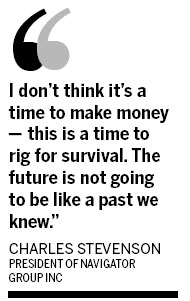Wall Street sees no exit from financial woes as bankers fret
Updated: 2011-10-13 07:49
(China Daily)
|
|||||||||
NEW YORK - Wall Street executives, facing demonstrators camped for a fourth week in New York's financial district, say they're anxious and angry for other reasons.
An era of decline and disappointment for bankers may not end for years, according to interviews with more than two-dozen executives and investors. Blaming government interference and persecution, they say there isn't enough global stability, leverage or risk appetite to triumph in the current slump.
"I don't think it's a time to make money - this is a time to rig for survival," said Charles Stevenson, president of hedge fund Navigator Group Inc. "The future is not going to be like a past we knew," he said. "There's no exit from this morass."
An anemic global economy, the European sovereign debt crisis, US unemployment stuck above 9 percent and swooning stock markets have sapped the euphoria that swept Wall Street in 2009 as it rebounded to record profits after the credit crisis.
The benefits of a $700 billion taxpayer bailout and $1.2 trillion in emergency funding from the US Federal Reserve Board have faded. Next week Goldman Sachs Group Inc may report its second quarterly loss a share since going public in 1999, according to the average estimate of 26 analysts surveyed by Bloomberg.
'Financial bubble'
"They're not going to make the kind of money they wanted," said William Hambrecht, chairman of WR Hambrecht & Co, who designed the Dutch auction of Google Inc's 2004 initial public offering. "I'm not sure people really have come to terms with the fact that what we had was a financial bubble."
New rules from the Basel Committee on Banking Supervision will more than double capital requirements for banks.
Fixed-income revenue could fall 25 percent under a draft of the Volcker rule, which may outlaw so-called flow trading, according to a note on Monday from Brad Hintz, a Sanford C. Bernstein & Co analyst.
Leverage has been cut by more than half at banks including Goldman Sachs and UBS AG, and an Oliver Wyman and Morgan Stanley report estimates that regulation may reduce returns on equity by 4 to 6 percentage points.
"The whole capitalist system is being called into question," said John Phelan, co-founder of MSD Capital LP, a New York-based fund that manages assets for billionaire Michael Dell.
'Ways to profiteer'

Not everyone is worried about the banks.
"I wouldn't shed too many tears for Wall Street," said Neil Barofsky, 41, the former special inspector general for the Troubled Asset Relief Program who is now teaching a class on the financial crisis at New York University School of Law.
"The systemic advantage that the too-big-to-fail banks enjoyed in the lead-up to the financial crisis may be diminished in the near term, but the structure is still essentially the same and will almost certainly help catapult them to record profits and bonuses once the good times return."
Ross, the billionaire chairman of New York-based WL Ross & Co, said Wall Street's "inherent ingenuity" shouldn't be discounted and that "the history of the investment community shows that it will find ways to profiteer".
Others identified potential financial bright spots, including so-called black-swan and tail-risk funds designed to protect against market shocks.
While there had been "an understandable path" out of the turmoil of 2008, there's a more encompassing uncertainty now, said Frederick Lane, vice-chairman of investment banking at St. Petersburg, Florida-based Raymond James Financial Inc.
"There's going to be some disillusionment, similar to physicians," Lane said. "The notion that somehow going to medical school would deliver you substantial wealth and prestige is no longer true."
Ilana Weinstein, CEO of search company IDW Group LLC, said in an interview that she had nothing good to offer a trading executive in his early 40s who complained last month about morale at his bank, one of the six largest in the United States.
"This is the first time that people don't necessarily believe it will get better," Weinstein said.
Job cuts
The biggest global banks already had been cutting jobs at the fastest rate since 2008 when Bank of America Corp said last month that it will eliminate 30,000 positions. London-based HSBC Holdings PLC, Europe's largest lender, aims to shed the same amount. UBS, Switzerland's biggest bank, is shrinking after a $2.3 billion trading loss.
"Sharply" falling profits will lead to almost 10,000 financial-services job cuts in New York City by the end of 2012, according to a report released on Tuesday by New York State Comptroller Thomas P. DiNapoli. The prospects for Wall Street "have cooled considerably," he said in a statement.
"The stress levels are getting very high," said MSD Capital's Phelan. The 46-year-old hedge-fund manager said the current aversion to risk across Wall Street could jeopardize profits.
"It's one of the things I struggle with: Everybody's risk-off, so should I be risk-on?" he said. "There are so many things I have to worry about."
Occupy Wall Street
Social unrest is taking place in lower Manhattan's Zuccotti Park, where Occupy Wall Street protests against bank bailouts and income inequality have gained support from Nobel Prize-winning economists Joseph Stiglitz and Paul Krugman.
The US government doesn't have "enough regulations stopping Wall Street from misbehaving", Stiglitz, an economics professor at Columbia University, told protesters the next day. "We are bearing the cost of their misdeeds. There's a system where we've socialized losses and privatized gains. That's not capitalism."
Bloomberg News
(China Daily 10/13/2011 page17)









